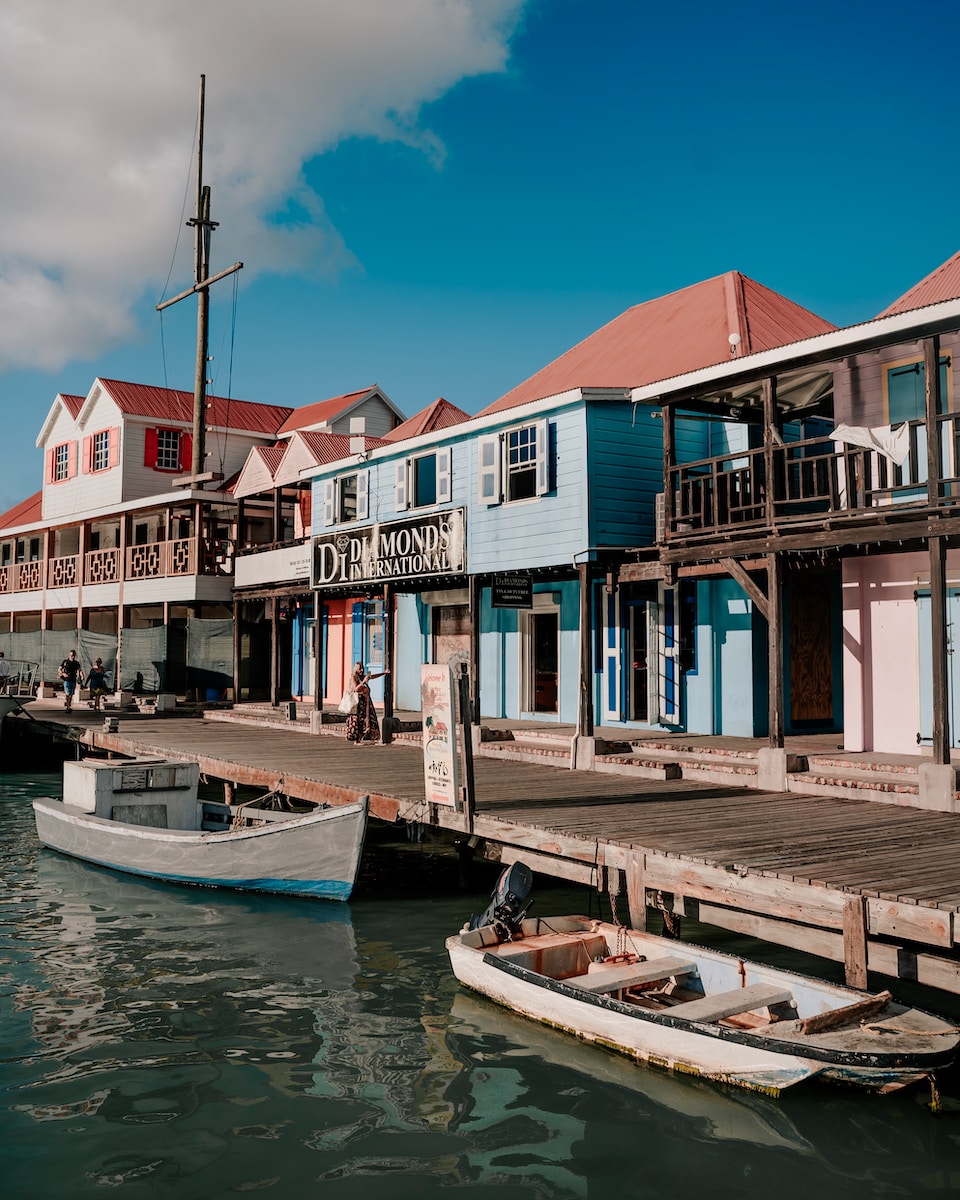Table of Contents
Antigua and Barbuda: Your Ultimate Money Guide for Tourists and Business Payments
Introduction: When visiting Antigua and Barbuda, it is essential to familiarize yourself with the local currency and payment methods to ensure a smooth and hassle-free experience. This money guide provides valuable information on how to pay in Antigua and Barbuda, catering to both tourists and business travelers. By understanding the accepted forms of payment and currency exchange options, you can navigate financial transactions with ease during your stay in this beautiful Caribbean destination.
Currency Exchange: A Guide for Tourists and Business in Antigua and Barbuda

Antigua and Barbuda, a stunning Caribbean destination known for its pristine beaches and vibrant culture, is a popular choice for tourists and business travelers alike. If you're planning a trip to this tropical paradise, it's essential to familiarize yourself with the local currency and understand how to pay for goods and services during your stay. In this article, we'll provide a comprehensive guide on currency exchange in Antigua and Barbuda, ensuring that you have a smooth and hassle-free experience. The official currency of Antigua and Barbuda is the Eastern Caribbean dollar (XCD). This currency is also used by several other countries in the region, including Dominica, Grenada, and Saint Lucia. The Eastern Caribbean dollar is pegged to the United States dollar at a fixed rate of 2.70 XCD to 1 USD. This means that the exchange rate remains constant, providing stability for both locals and visitors. When it comes to exchanging your currency for Eastern Caribbean dollars, there are several options available. One of the most convenient ways is to withdraw cash from ATMs, which are widely available throughout the islands. However, it's important to note that some ATMs may charge a fee for international transactions, so it's advisable to check with your bank beforehand. Another option is to exchange your currency at local banks or authorized currency exchange offices. These establishments typically offer competitive rates and provide a safe and reliable service. It's recommended to carry a small amount of cash in US dollars for emergencies or situations where card payments may not be accepted. Speaking of card payments, most businesses in Antigua and Barbuda accept major credit and debit cards, such as Visa and Mastercard. However, it's always a good idea to carry some cash with you, as smaller establishments and street vendors may only accept cash payments. Additionally, it's worth notifying your bank of your travel plans to avoid any potential issues with your cards being blocked due to suspicious activity. If you prefer to use traveler's checks, they are widely accepted in Antigua and Barbuda. However, it's important to keep in mind that traveler's checks may not be as widely accepted as they once were, so it's advisable to have an alternative payment method available. When it comes to tipping in Antigua and Barbuda, it's customary to leave a gratuity of around 10-15% at restaurants, bars, and for taxi drivers. Some establishments may include a service charge in the bill, so it's worth checking before adding an additional tip. It's also common to tip hotel staff, such as housekeeping and bellboys, a small amount for their services. In conclusion, understanding how to pay in Antigua and Barbuda is essential for a smooth and enjoyable trip. Familiarize yourself with the local currency, the Eastern Caribbean dollar, and consider the various options for currency exchange, such as ATMs and banks. Carry a mix of cash and cards, and notify your bank of your travel plans to avoid any issues with your cards. Remember to tip appropriately and enjoy your time in this beautiful Caribbean destination.
Understanding the Currency Exchange System in Argentina
Argentina is a beautiful country with a rich culture and vibrant cities. Whether you are visiting as a tourist or conducting business, it is important to understand the currency exchange system in Argentina. This guide will provide you with all the information you need to know about paying in Argentina. The official currency of Argentina is the Argentine Peso (ARS). It is important to note that the exchange rate for the Argentine Peso can fluctuate, so it is a good idea to check the current rate before your trip. You can easily find this information online or at a local bank. When it comes to exchanging your money, there are several options available to you. One option is to exchange your currency at a bank. Banks in Argentina typically offer competitive exchange rates, but they may charge a commission fee for the service. It is a good idea to compare rates and fees at different banks to ensure you are getting the best deal. Another option is to exchange your money at a currency exchange office. These offices are often found in tourist areas and offer convenient hours of operation. While the exchange rates at these offices may not be as favorable as those at banks, they are still a viable option if you need to exchange money quickly. If you prefer to use your credit or debit card while in Argentina, it is important to notify your bank before your trip. This will prevent any issues with your card being blocked due to suspicious activity. Most businesses in Argentina accept major credit cards, but it is always a good idea to carry some cash with you for smaller establishments that may not accept cards. When using your card, be aware that some businesses may charge an additional fee for credit card transactions. This fee is usually a percentage of the total purchase amount. It is a good idea to ask about any additional fees before making a purchase to avoid any surprises. ATMs are widely available in Argentina and are a convenient way to withdraw cash. However, it is important to be cautious when using ATMs, especially those located on the street. Look for ATMs that are located inside banks or in well-lit areas to minimize the risk of theft. When withdrawing cash from an ATM, be aware that there may be a limit on the amount you can withdraw per transaction. Additionally, some ATMs may charge a fee for withdrawals. It is a good idea to check with your bank to see if they have any partnerships with banks in Argentina that may waive these fees. In conclusion, understanding the currency exchange system in Argentina is essential for both tourists and business travelers. Whether you choose to exchange your money at a bank, currency exchange office, or use your credit or debit card, it is important to be aware of any fees or charges associated with these transactions. By being prepared and informed, you can ensure a smooth and hassle-free experience when paying in Argentina.

Tips for Using Credit Cards and Debit Cards in Argentina
Are you planning a trip to Antigua and Barbuda? If so, it's important to know how to pay for your expenses while you're there. In this money guide, we'll be discussing tips for using credit cards and debit cards in Antigua and Barbuda, so you can have a smooth and hassle-free experience. First and foremost, it's important to note that credit cards are widely accepted in Antigua and Barbuda. Most hotels, restaurants, and shops will accept major credit cards such as Visa and Mastercard. This is great news for tourists and business travelers, as it means you won't have to carry large amounts of cash with you. When using your credit card in Antigua and Barbuda, it's important to notify your bank or credit card company beforehand. This will help prevent any issues or holds on your card due to suspicious activity. Additionally, it's a good idea to have a backup credit card or debit card with you, just in case your primary card gets lost or stolen. While credit cards are widely accepted, it's worth noting that some smaller establishments may only accept cash. Therefore, it's always a good idea to carry some local currency with you. The official currency of Antigua and Barbuda is the Eastern Caribbean dollar (XCD). You can easily exchange your currency for Eastern Caribbean dollars at banks or currency exchange offices. When it comes to using debit cards in Antigua and Barbuda, it's important to be aware of any fees that may be associated with international transactions. Some banks may charge a foreign transaction fee or an ATM withdrawal fee when using your debit card abroad. It's a good idea to check with your bank beforehand to understand what fees may apply. When using your debit card at an ATM in Antigua and Barbuda, it's important to be cautious and choose ATMs that are located in well-lit and secure areas. It's also a good idea to cover the keypad when entering your PIN to protect against any potential skimming devices. Another tip for using credit cards and debit cards in Antigua and Barbuda is to keep track of your transactions. It's a good idea to regularly check your credit card or bank statements to ensure that there are no unauthorized charges. If you do notice any suspicious activity, be sure to report it to your bank or credit card company immediately. In conclusion, using credit cards and debit cards in Antigua and Barbuda is generally a convenient and safe way to pay for your expenses. Most establishments accept major credit cards, but it's always a good idea to carry some local currency with you, especially for smaller establishments. Be sure to notify your bank or credit card company before your trip, and keep track of your transactions to ensure a smooth and hassle-free experience. Happy travels!
Exploring the Use of Cash and ATMs in Argentina
Argentina is a beautiful country with a rich culture and vibrant cities. Whether you're a tourist exploring its wonders or a business traveler attending meetings, it's important to know how to pay for your expenses. In this money guide, we'll explore the use of cash and ATMs in Argentina, providing you with valuable information to make your trip hassle-free. When it comes to paying in Argentina, cash is still king. While credit and debit cards are widely accepted in major establishments, smaller businesses and local markets often prefer cash. It's always a good idea to carry some Argentine pesos with you, especially when venturing outside of major cities. To obtain cash, you can visit one of the many ATMs scattered throughout the country. ATMs in Argentina are known as “cajeros automáticos” and are easily accessible. However, it's important to note that not all ATMs accept foreign cards, so it's advisable to look for those labeled with international card symbols such as Visa or Mastercard. Before using an ATM, make sure to inform your bank about your travel plans to avoid any issues with your card being blocked. Additionally, be cautious of your surroundings and use ATMs located in well-lit and secure areas. It's always better to be safe than sorry! When withdrawing cash from an ATM in Argentina, you may encounter withdrawal limits. These limits vary depending on the bank and the type of account you have. It's a good idea to check with your bank beforehand to ensure you have access to enough cash for your needs. Another important aspect to consider is the fees associated with ATM withdrawals. Some banks charge a fixed fee per transaction, while others charge a percentage of the amount withdrawn. These fees can quickly add up, so it's advisable to withdraw larger amounts less frequently to minimize costs. If you prefer not to carry large amounts of cash, you can also use your credit or debit card for payments. Most establishments in major cities accept cards, but it's always a good idea to carry some cash as a backup. Additionally, be aware that some smaller businesses may charge an extra fee for card payments, so it's always a good idea to ask beforehand. When using your card, it's important to keep an eye on the exchange rate. Some establishments may offer to charge your card in your home currency, but this often comes with a higher exchange rate and additional fees. Opting to pay in Argentine pesos is usually the most cost-effective option. In conclusion, when it comes to paying in Argentina, cash is still widely used, especially in smaller establishments. ATMs are readily available, but it's important to check if they accept foreign cards and be mindful of withdrawal limits and fees. Credit and debit cards are widely accepted in major cities, but carrying some cash as a backup is always a good idea. By being prepared and informed, you can navigate the Argentine payment system with ease and enjoy your time in this beautiful country.

Navigating the Different Payment Methods in Argentina
Antigua and Barbuda is a beautiful Caribbean destination that attracts tourists and business travelers from all over the world. When visiting this stunning island nation, it's important to familiarize yourself with the different payment methods available to ensure a smooth and hassle-free experience. In this article, we will guide you through the various ways you can pay in Antigua and Barbuda, whether you're a tourist or on a business trip. One of the most common payment methods in Antigua and Barbuda is cash. The local currency is the Eastern Caribbean dollar (XCD), and it's widely accepted throughout the country. You can easily exchange your currency for XCD at banks, exchange bureaus, or even at the airport upon arrival. It's always a good idea to carry some cash with you for small purchases, as some smaller establishments may not accept credit cards. Speaking of credit cards, they are widely accepted in Antigua and Barbuda, especially in larger hotels, restaurants, and shops. Major credit cards like Visa, Mastercard, and American Express are commonly used, so you won't have any trouble paying with plastic. However, it's worth noting that some smaller establishments may have a minimum spend requirement for credit card payments, so it's always a good idea to have some cash on hand. If you prefer a more convenient and contactless payment method, you'll be pleased to know that Antigua and Barbuda also embrace digital payments. Mobile payment apps like Apple Pay and Google Pay are becoming increasingly popular, allowing you to make payments with just a tap of your phone. Many businesses, especially in the tourism sector, have adopted these digital payment options to cater to the needs of tech-savvy travelers. For those who prefer a more traditional approach, traveler's checks are still accepted in Antigua and Barbuda. These checks can be easily exchanged for local currency at banks or exchange bureaus. However, it's important to note that traveler's checks are not as widely accepted as they once were, so it's always a good idea to have an alternative payment method available. When it comes to tipping in Antigua and Barbuda, it's customary to leave a gratuity of around 10-15% at restaurants, bars, and for taxi drivers. Some establishments may include a service charge in the bill, so be sure to check before adding an additional tip. It's always a nice gesture to show your appreciation for good service, and it's a way to support the local economy. In conclusion, navigating the different payment methods in Antigua and Barbuda is relatively straightforward. Cash, credit cards, mobile payment apps, and traveler's checks are all widely accepted, ensuring that you have plenty of options to choose from. Remember to carry some cash for smaller establishments, and always check for any minimum spend requirements for credit card payments. By familiarizing yourself with the local payment methods, you'll be able to enjoy your time in Antigua and Barbuda without any payment-related worries.
Managing Currency Conversion Fees and Charges in Argentina
Argentina is a beautiful country with a rich culture and vibrant cities. Whether you are visiting as a tourist or conducting business, it is important to understand how to manage currency conversion fees and charges. In this article, we will provide you with a money guide for tourists and business in Argentina, so you can make the most of your trip without breaking the bank. When it comes to managing currency conversion fees and charges in Argentina, there are a few key things to keep in mind. First and foremost, it is important to know that the official currency of Argentina is the Argentine Peso (ARS). While some businesses may accept US dollars or other foreign currencies, it is generally recommended to have some Argentine Pesos on hand for day-to-day expenses. One of the easiest ways to obtain Argentine Pesos is by using ATMs. Argentina has a well-developed banking system, and ATMs can be found throughout the country. However, it is important to be aware of the fees associated with using foreign ATMs. Many banks charge a fee for international withdrawals, and these fees can quickly add up. To minimize these charges, it is a good idea to withdraw larger amounts of money less frequently. Another option for managing currency conversion fees is to use a credit card. Most businesses in Argentina accept major credit cards, and this can be a convenient way to pay for goods and services. However, it is important to check with your credit card provider about any foreign transaction fees that may apply. Some credit cards charge a percentage fee for international purchases, so it is important to factor this into your budget. If you prefer to carry cash, it is important to be cautious when exchanging money. While there are many currency exchange offices in Argentina, it is recommended to use reputable establishments to avoid scams or counterfeit currency. Additionally, it is important to compare exchange rates and fees before making a transaction. Some exchange offices may offer better rates than others, so it is worth shopping around. When it comes to managing currency conversion fees and charges, it is also important to be aware of the current exchange rate. Currency exchange rates can fluctuate daily, and this can have a significant impact on the amount of money you receive. It is a good idea to check the current exchange rate before making any transactions, so you can get the most value for your money. Lastly, it is important to keep track of your expenses and budget accordingly. By keeping a record of your spending, you can better manage your finances and avoid any surprises. This can be especially important for business travelers who need to keep track of expenses for reimbursement purposes. In conclusion, managing currency conversion fees and charges in Argentina is an important aspect of any trip. By being aware of the various options available, such as using ATMs, credit cards, or exchanging cash, you can make informed decisions and minimize fees. Additionally, staying up to date with the current exchange rate and keeping track of your expenses can help you stay within your budget. With these tips in mind, you can enjoy your time in Argentina without worrying about your finances.
Safety Measures for Carrying and Handling Money in Argentina
Antigua and Barbuda is a stunning Caribbean destination that attracts tourists and business travelers from all over the world. As you plan your trip to this beautiful country, it's important to be aware of the various payment options and safety measures when it comes to handling money. Carrying cash is a common practice for many travelers, but it's crucial to take precautions to ensure the safety of your money. One of the first things you should do is to divide your cash into smaller amounts and keep them in different places. This way, if you lose one portion or it gets stolen, you won't be left completely empty-handed. Another safety measure is to avoid carrying large amounts of cash with you at all times. Instead, only take what you need for the day and leave the rest in a secure location, such as a hotel safe. This reduces the risk of losing all your money in case of theft or misplacement. When it comes to handling cash in Antigua and Barbuda, it's important to be mindful of your surroundings. Avoid counting your money in public places, as this can attract unwanted attention. Instead, find a private and secure location, such as your hotel room, to count and organize your cash. While cash is widely accepted in Antigua and Barbuda, it's also a good idea to have a backup payment method, such as a credit or debit card. Most hotels, restaurants, and shops accept major credit cards, making it convenient for you to make purchases without carrying large amounts of cash. Before your trip, make sure to inform your bank or credit card company about your travel plans. This will prevent any unexpected issues with your cards being blocked due to suspicious activity. Additionally, it's a good idea to have the contact information for your bank or credit card company readily available in case you need to report a lost or stolen card. If you prefer not to carry cash or use your credit card, you can also consider using traveler's checks. These checks are widely accepted in Antigua and Barbuda and provide an added layer of security. However, keep in mind that traveler's checks may not be as widely accepted as cash or credit cards, so it's always a good idea to have some cash on hand as well. When it comes to exchanging your money, it's best to do so at authorized exchange offices or banks. These establishments offer competitive exchange rates and ensure that you receive genuine currency. Avoid exchanging money with street vendors or unauthorized individuals, as they may offer unfavorable rates or counterfeit bills. In conclusion, when it comes to paying in Antigua and Barbuda, it's important to prioritize safety and security. Divide your cash, avoid carrying large amounts, and be mindful of your surroundings. Consider having a backup payment method, inform your bank about your travel plans, and use authorized exchange offices for currency exchange. By following these safety measures, you can enjoy a worry-free experience when handling money in Antigua and Barbuda.

Summary on payments in Antigua and Barbuda
Conclusion: When visiting Antigua and Barbuda as a tourist or for business purposes, it is important to be aware of the local currency and payment options. The official currency is the Eastern Caribbean dollar (XCD), which is widely accepted throughout the islands. Cash is the most commonly used form of payment, and it is advisable to carry small denominations for convenience. Credit and debit cards are also widely accepted in hotels, restaurants, and larger establishments, but it is recommended to carry cash for smaller vendors and local markets. ATMs are available in major towns and tourist areas, providing easy access to cash. Additionally, it is important to notify your bank or credit card company about your travel plans to avoid any issues with card usage. Overall, having a combination of cash and cards will ensure a smooth payment experience while in Antigua and Barbuda.

